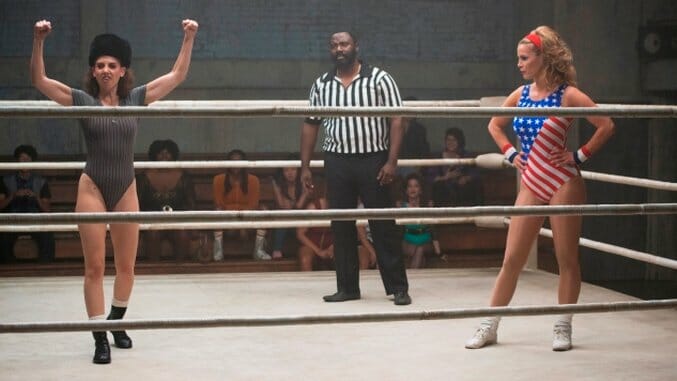Netflix’s GLOW Respects Its Characters and Pro Wrestling
Promotional images provided by Netflix
At first I was unsure what to think of GLOW, the Netflix series based on the story of the ‘80s wrestling show of the same name. Obviously, if you’re telling the story from the beginning, key elements (as in the wrestling) were going to take time to seep in. I was trying not to watch the show “as a wrestling fan,” but it also felt like it would be hard to gauge as a TV show until it felt more fully-formed.
Thankfully, it only takes about three of the season’s ten episodes, which all premiere on June 23, to get there. After my initial hesitance I wound up finishing the whole season in one sitting—at a half-hour, this is one of Netflix’s most bingeable shows yet. And once things get going, it checks the requisite boxes from a wrestling fan point of view, as well.
So far, many of the reviews have focused on the bond that develops between the women and the show’s feminist messages. And they should: They’re the focus of the show, as is expected with Jenji Kohan of Orange is the New Black helming the project. Plus, it’s true to life, as anyone who has seen the 2012 documentary about GLOW (also available on Netflix) can tell you. Wrestlers gravitate enough to each other as it is, especially if they trained together; that’s going to be more pronounced if they were mostly actresses with little to no experience at contact sports who were then made to all live together.
But one thing that this show does better than just about any other show or movie about the genre is how it bottles up what makes wrestling fans (and that includes the performers) tick and then pours it all over the screen. That we carry this fandom from our childhoods and never entirely outgrow it, because it’s such a uniquely enjoyable brand of entertainment. One that is more exciting than just about anything else at its best. That cheering and booing—or getting people to cheer and boo—is just plain fun. Compare that to Darren Aronofsky’s The Wrestler, which is a well-made film (albeit very patterned in spots), but mostly serves as a depressing character study about a drug addict and adrenaline junky who wrestles past his expiration date because he doesn’t know anything else. Sure, Aronofsky taps into the rush of performing before a live crowd at times, but if you’re not a wrestling fan, you don’t come away from the movie understanding why he got into the business in the first place and why he has fans.
That’s a part of what makes GLOW special, though. As things start to click for a character, and they learn that wrestling is a demented mix of soap opera, combat sport and puppet show, they start to realize how much fun they’re having and fall in love with wrestling as a performance art. Some of that understanding isn’t even in the dialogue: Chris Lowell (Veronica Mars, Private Practice) as Bash, the producer/backer, and Britney Young (Those Who Can’t) as Carmen, the one girl in a family full of pro wrestlers, give performances that evoke authentic wrestling fans, even when they’re not providing viewer-friendly exposition about heels and faces. It’s hard to put your finger on, but when you have spent your whole life watching TV shows and movies where even wrestling fan portrayals intended as positive, like Marshall and Lily’s fandom on How I Met Your Mother, usually come off as pandering or condescending, you know it when you see it.
There’s also one character, whose exact nature I won’t spoil (but should become self-evident early on), who had spent her whole life feeling like a freak. Getting cast on the show within a show, where she can be herself, was the first time that she really felt she could be herself. It’s not a foreign concept to us as wrestling fans (and I include wrestlers in the group). In high school, when I saw someone else wearing the exact same Toryumon 2000 Project shirt that I owned, I felt like at least a little less of a weirdo for watching this stuff. Even if times have changed in the last five years, and pro wrestling is as close as it has ever been to being accepted as a mainstream genre of entertainment, there’s a small part of me that still gets a twinge of that feeling when I see a Bullet Club shirt on the subway.